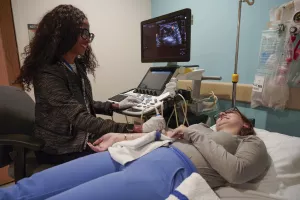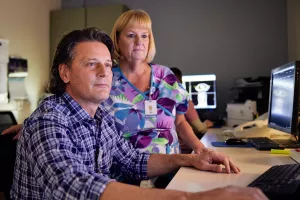Interventional radiology uses the power of image-guiding technologies like a CT scan, MRI, ultrasound or X-ray to perform minimally invasive procedures. Your doctor may recommend interventional radiology instead of surgery in certain situations.
Picture a less painful alternative to surgery
There’s more to radiology than just detecting and diagnosing medical conditions. With interventional radiology, all it takes is a small incision (usually the size of a pencil tip) to treat a variety of conditions. Smaller incisions mean less pain and a quicker return to what you enjoy most.
Our team of radiologists, specially trained nurses, technologists and physician assistants work together to create a treatment path that puts your comfort first.

Conditions
Interventional radiologists team up with doctors from specialty departments, including:
Together, we provide care for patients living with conditions, like:
Testing
Depending on your symptoms, your doctor will use one or a combination of these tests:
Treatments
One of the best things about interventional radiology is that we can diagnose and treat people using the same tools.
Once we understand what condition you're living with, we'll walk you through a variety of interventional radiology procedures we can use to get you on the road to recovery, faster. Very few treatments require general anesthesia and we can usually get you in and out on the same day.
Cancer can feel complicated, but treating it doesn't have to be. We turn to the following interventional radiology approaches to treat different kinds of cancer:
- Embolization
- Radiofrequency ablation
- Port placement
Gastronomy tubes (feeding tubes) are one of the interventional radiology methods we can take to treat conditions affecting your gastrointestinal and digestive health.
When there's excess fluid buildup present, we use the following approaches to offer relief:
- Abscess drainage
- Thoracentesis and paracentesis
We can offer minimally invasive care for your kidney condition, like:
- Dialysis catheter placement
- Hemodialysis access maintenance
Picture minimally invasive liver care with the following interventional radiology methods:
- Transhepatic cholangiogram
- Transjugular intrahepatic portosystemic shunt
These interventional radiology procedures can help treat conditions affecting your reproductive system:
- Uterine fibroid embolization
- Nephrostomy tubes
- Ureteral stenting
These spinal care procedures can relieve pain and restore your mobility:
- Kyphoplasty
- Myelography
- Vertebroplasty
Veins stretch for miles inside the body, carrying blood to the heart. So, when your veins aren't working as they should, we can treat your condition with these procedures:
- Angiography with angioplasty
- Stenting
- Thrombolysis
- Embolization
- Deep venous thrombosis
- Varicose vein and varicocele therapy
- Venous access procedures
- IVC filter placement

From regular office visits to inpatient stays, find the healthcare you need and deserve close to home.

Meet the doctors and care team devoted to supporting you every step of the way along your path to better health.